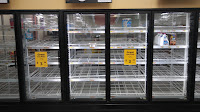 |
| Hurricane Matthew Insurance Claim Denied? |
Hurricane Matthew Insurance Claim Denied?
"often times you must make
a claim within a
certain period of time
in order to be covered . . . "
Here is some great information from Caitlin Costa an experienced lawyer who represents home and business owners in Florida Insurance Claims.
Denials of Claims are coming back at a furious pace.
Cities with huge losses and possible
claims denied from Hurricane Matthew include: Amelia Island, Anastasia Island, Atlantic Beach, Cocoa Beach, Crescent Beach, Davis Shores, Daytona Beach, Duval County, Fernandina Beach, Flagler Beach, Jacksonville Beach, Lincolnville, Marineland, Neptune Beach, New Smyrna Beach, Ormond Beach, Palm Coast, Ponte Vedra, Saint Augustine, St. Johns County, Vilano Beach, Volusia County
Always Be Prepared
1. Know your coverage. Request a complete, certified copy of your Policy. You are entitled to this, and may only have a Declarations page which does not fully capture your coverage or duties under the Policy.
2. Make sure that you are not underinsured. Hurricanes and other major weather events can wreak havoc on properties with wind, rain, flood, water intrusion and other types of losses that can create astronomical repair costs.
3. Document your conversations with your insurance company.
a. Pay attention to deadlines.
b. Try to get confirmation in writing.
c. Keep a detailed notes of events surrounding damage, your claim, repairs, etc.
d. Keep your receipts.
4. Be safe and be wary of scams.
5. Safeguard your property from further damage to the extent possible. Insurers like to claim their insureds did not “mitigate” or prevent further loss.
6. Make sure you understand what you’re signing- e.x. a work authorization vs. a full Assignment of Benefits.
7. Get a second opinion/back up quote regarding damages sustained.
Before the Next Storm
Before the Next Storm make sure:
1. Review your policy. If you do not understand your coverage, contact your agent or insurance representative.
2. Take pictures and/or video of the interior and exterior of your property before the storm. You may need comparison photos to substantiate future claims.
3. Make an inventory of valuable personal property and consider obtaining additional coverage for valuables.
4. Be prepared for the storm itself.
5. Listen to storm evacuation notifications by authorities. Don’t be a hero. Your property is not worth your life
During the Next Storm
During the Next Storm:
1. Be safe. Protect yourself and your family, and safeguard your property against damage in advance.
2. If you can safely do so, document damage to property as it is occurring (i.e. an active leak during the storm).
After the Storm
After this Storm:
1. Give prompt notice of claim(s) to your insurer - report claim as soon as possible; often times you must make a claim within a certain period of time in order to be covered (see policy)
a. List damaged items in notice
b. It is okay to call in your claim but follow-up in writing
c. Document everything
2. Take pictures and/or video of the interior and exterior of your property after the storm
3. Pay attention to any deadlines in your Policy and make sure to comply.
a. e.x. your insurer may request a “Proof of Loss” document, which often must be received by your insurer 60 days after loss, or 60 after requested depending on Policy.
4. Keep a detailed inventory of damages (incl. personal property)
5. Keep any and all repair receipts.
6. If it is not safe to remain on your property, be sure to know your Additional Living Expenses (ALE) Coverage. This coverage can help defray the costs of living outside of your home while it is repaired or rebuilt.
7. Keep any and all receipts for hotel stays and eating our if displaced.
8. Consider getting your own estimate for repairs.
9. Consult an attorney to preserve your legal rights.















